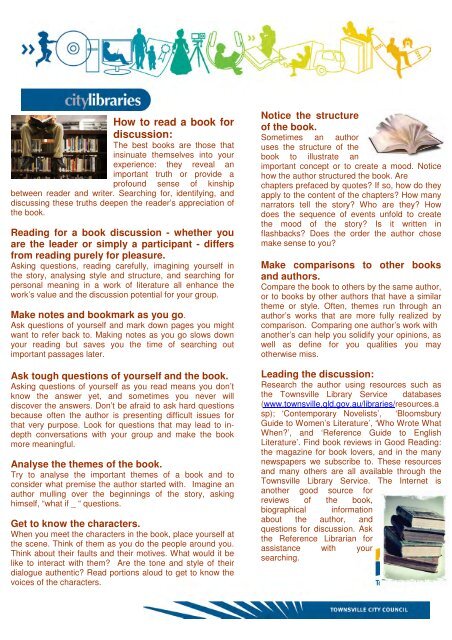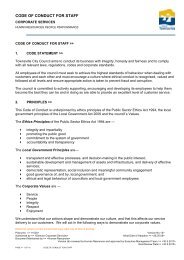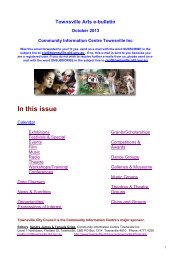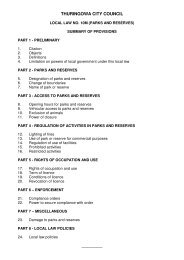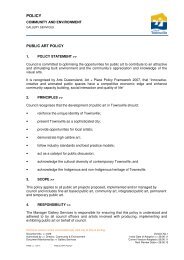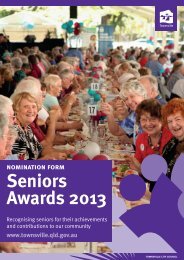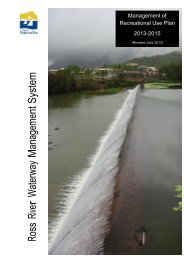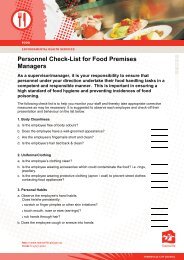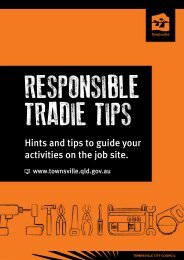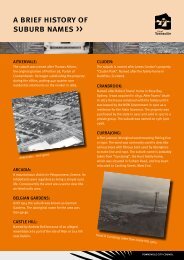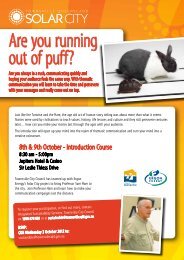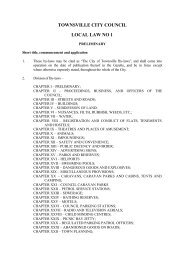How to read a book for discussion:
How to read a book for discussion:
How to read a book for discussion:
Create successful ePaper yourself
Turn your PDF publications into a flip-book with our unique Google optimized e-Paper software.
<strong>How</strong> <strong>to</strong> <strong>read</strong> a <strong>book</strong> <strong>for</strong><br />
<strong>discussion</strong>:<br />
The best <strong>book</strong>s are those that<br />
insinuate themselves in<strong>to</strong> your<br />
experience: they reveal an<br />
important truth or provide a<br />
profound sense of kinship<br />
between <strong>read</strong>er and writer. Searching <strong>for</strong>, identifying, and<br />
discussing these truths deepen the <strong>read</strong>er’s appreciation of<br />
the <strong>book</strong>.<br />
Reading <strong>for</strong> a <strong>book</strong> <strong>discussion</strong> - whether you<br />
are the leader or simply a participant - differs<br />
from <strong>read</strong>ing purely <strong>for</strong> pleasure.<br />
Asking questions, <strong>read</strong>ing carefully, imagining yourself in<br />
the s<strong>to</strong>ry, analysing style and structure, and searching <strong>for</strong><br />
personal meaning in a work of literature all enhance the<br />
work’s value and the <strong>discussion</strong> potential <strong>for</strong> your group.<br />
Make notes and <strong>book</strong>mark as you go.<br />
Ask questions of yourself and mark down pages you might<br />
want <strong>to</strong> refer back <strong>to</strong>. Making notes as you go slows down<br />
your <strong>read</strong>ing but saves you the time of searching out<br />
important passages later.<br />
Ask <strong>to</strong>ugh questions of yourself and the <strong>book</strong>.<br />
Asking questions of yourself as you <strong>read</strong> means you don’t<br />
know the answer yet, and sometimes you never will<br />
discover the answers. Don’t be afraid <strong>to</strong> ask hard questions<br />
because often the author is presenting difficult issues <strong>for</strong><br />
that very purpose. Look <strong>for</strong> questions that may lead <strong>to</strong> indepth<br />
conversations with your group and make the <strong>book</strong><br />
more meaningful.<br />
Analyse the themes of the <strong>book</strong>.<br />
Try <strong>to</strong> analyse the important themes of a <strong>book</strong> and <strong>to</strong><br />
consider what premise the author started with. Imagine an<br />
author mulling over the beginnings of the s<strong>to</strong>ry, asking<br />
himself, “what if _ “ questions.<br />
Get <strong>to</strong> know the characters.<br />
When you meet the characters in the <strong>book</strong>, place yourself at<br />
the scene. Think of them as you do the people around you.<br />
Think about their faults and their motives. What would it be<br />
like <strong>to</strong> interact with them? Are the <strong>to</strong>ne and style of their<br />
dialogue authentic? Read portions aloud <strong>to</strong> get <strong>to</strong> know the<br />
voices of the characters.<br />
Notice the structure<br />
of the <strong>book</strong>.<br />
Sometimes an author<br />
uses the structure of the<br />
<strong>book</strong> <strong>to</strong> illustrate an<br />
important concept or <strong>to</strong> create a mood. Notice<br />
how the author structured the <strong>book</strong>. Are<br />
chapters prefaced by quotes? If so, how do they<br />
apply <strong>to</strong> the content of the chapters? <strong>How</strong> many<br />
narra<strong>to</strong>rs tell the s<strong>to</strong>ry? Who are they? <strong>How</strong><br />
does the sequence of events unfold <strong>to</strong> create<br />
the mood of the s<strong>to</strong>ry? Is it written in<br />
flashbacks? Does the order the author chose<br />
make sense <strong>to</strong> you?<br />
Make comparisons <strong>to</strong> other <strong>book</strong>s<br />
and authors.<br />
Compare the <strong>book</strong> <strong>to</strong> others by the same author,<br />
or <strong>to</strong> <strong>book</strong>s by other authors that have a similar<br />
theme or style. Often, themes run through an<br />
author’s works that are more fully realized by<br />
comparison. Comparing one author’s work with<br />
another’s can help you solidify your opinions, as<br />
well as define <strong>for</strong> you qualities you may<br />
otherwise miss.<br />
Leading the <strong>discussion</strong>:<br />
Research the author using resources such as<br />
the Townsville Library Service databases<br />
(www.<strong>to</strong>wnsville.qld.gov.au/libraries/resources.a<br />
sp); ‘Contemporary Novelists’, ‘Bloomsbury<br />
Guide <strong>to</strong> Women’s Literature’, ‘Who Wrote What<br />
When?’, and ‘Reference Guide <strong>to</strong> English<br />
Literature’. Find <strong>book</strong> reviews in Good Reading:<br />
the magazine <strong>for</strong> <strong>book</strong> lovers, and in the many<br />
newspapers we subscribe <strong>to</strong>. These resources<br />
and many others are all available through the<br />
Townsville Library Service. The Internet is<br />
another good source <strong>for</strong><br />
reviews of the <strong>book</strong>,<br />
biographical in<strong>for</strong>mation<br />
about the author, and<br />
questions <strong>for</strong> <strong>discussion</strong>. Ask<br />
the Reference Librarian <strong>for</strong><br />
assistance with your<br />
searching.
Use the <strong>discussion</strong> guide.<br />
Most of the CityLibraries <strong>book</strong>club kits come with a <strong>read</strong>ing<br />
guide. This guide is generally produced by the publisher<br />
and includes some in<strong>for</strong>mation about the author, a synopis<br />
of the <strong>book</strong> and some questions <strong>to</strong> assist the groups in their<br />
<strong>discussion</strong>s.<br />
Come prepared with some openended<br />
questions.<br />
Questions that can be answered yes or no tend <strong>to</strong> cut off<br />
<strong>discussion</strong> quickly.<br />
Alternatively, ask each member of the group <strong>to</strong><br />
come with one <strong>discussion</strong> question.<br />
Readers will focus on different aspects of the <strong>book</strong>, and<br />
everyone will gain new insights as a result.<br />
Questions should be used <strong>to</strong> guide the<br />
<strong>discussion</strong> and keep it on track, but be<br />
<strong>read</strong>y <strong>to</strong> let the <strong>discussion</strong> flow naturally. Often you’ll find<br />
that the questions you have prepared will come up naturally<br />
as part of the <strong>discussion</strong>.<br />
Remind participants that there are not<br />
necessarily any right answers <strong>to</strong> the questions<br />
posed.<br />
Don’t be afraid <strong>to</strong> criticize a <strong>book</strong>,<br />
but try <strong>to</strong> get beyond the “I just<br />
didn’t like it” statement. What was<br />
it about the <strong>book</strong> that made it<br />
unappealing? The style? The<br />
pacing? The characters? Has the<br />
author written other <strong>book</strong>s that you<br />
liked better? Did it remind you of<br />
another <strong>book</strong> that you liked or disliked? Some of the best<br />
<strong>book</strong> <strong>discussion</strong>s centre on <strong>book</strong>s that many group<br />
members disliked.<br />
Try <strong>to</strong> keep a balance in the<br />
<strong>discussion</strong> between personal<br />
revelations and reactions and a<br />
response <strong>to</strong> the <strong>book</strong> itself.<br />
Of course, every <strong>read</strong>er responds <strong>to</strong> a <strong>book</strong> in<br />
ways that are intimately tied <strong>to</strong> his or her<br />
background, upbringing, experiences, and view<br />
of the world. A <strong>book</strong> about a senseless murder<br />
will naturally strike a chord in a <strong>read</strong>er whose<br />
friend was killed. That’s interesting, but what’s<br />
more interesting is how the author chose <strong>to</strong><br />
present the murder, or the author’s attitude<br />
<strong>to</strong>ward the murderer and victim. It’s<br />
often <strong>to</strong>o easy <strong>to</strong> let a group drown in<br />
reminiscences. If that’s what the whole group<br />
wants <strong>to</strong> do, that’s fine, but keep in mind that<br />
then it’s not a <strong>book</strong> <strong>discussion</strong>.<br />
Some suggestions <strong>for</strong> questions <strong>to</strong><br />
consider when <strong>read</strong>ing.<br />
>> Which character did you most identify with?<br />
Why?<br />
>> Which character did you most dislike? Why?<br />
>> Which character would you most like <strong>to</strong> be<br />
like? Why? >> If you could change anything<br />
about any character what would it be?<br />
>> Did any character portray any type of tragic<br />
flaw? Did this invoke sympathy <strong>for</strong> the<br />
character?<br />
>> Which event did you feel was most important<br />
in the <strong>book</strong>? <strong>How</strong> did it change the plot or<br />
outcome of the <strong>book</strong>?<br />
>> Did you feel the ending was appropriate <strong>to</strong><br />
the <strong>book</strong> as a whole? Did it stay true <strong>to</strong> the<br />
characters and the personalities that the<br />
characters possessed?<br />
>> <strong>How</strong> did this author compare <strong>to</strong> other authors<br />
you have <strong>read</strong> or <strong>to</strong> <strong>book</strong>s with similar subjects<br />
or time periods?


